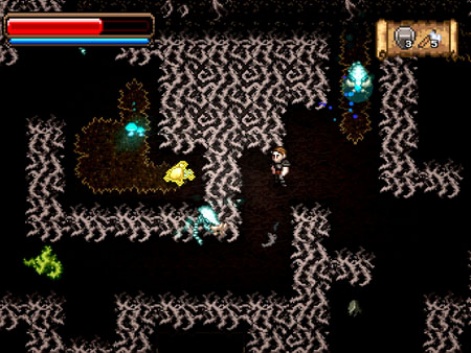The games industry is an alluring, passionate, and unpredictably cruel mistress.
For every developer that successfully navigates the minefield that is modern mobile development, there are another thousand that fall into the abyss, clutching their half-realised dreams as they fall into the darkness, surrounded by the silent screams of their brothers-in-arms.
No, really!
It doesn’t matter how much belief, talent, or determination you possess, because if luck isn’t on your side, you just won’t make it.
Sure, it might not be an ideal reality, but, unfortunately, it’s the one we live in.
it's not all doom and gloom though, because every now and again a developer manages to beat the odds and emerge victorious.
RocketCat Games, a three-man indie outfit based in the US, is one of those lucky few.
Formed at the start of the mobile shift, the RocketCat team have seen mobile evolve from a promising platform into a gaming behemoth.
Of course, they’ve contributed their fair share of games, introducing the world to titles such as Hook Champ ($2.99), Punch Quest (free), and, more recently, the critically-acclaimed Wayward Souls ($4.99, or $6.99 following update).
So, In our latest PocketGamer.biz studio profile we spoke to RocketCat’s business and design guru Kepa Auwae to find out more about the team’s humble beginnings, their unorthodox place in the mobile industry, and their desire to create the world’s first never-ending game.
Starting from scratch
Every journey has a first step, and for RocketCat that came when three unsuspecting members of an MMO chatroom realised they all shared one particular dream.
We picked mobile because at the time that was the easiest one to get into.KEPA AUWAE
“Before I was a developer I was a registered nurse I was working night shifts, and it was a really slow work assignment, so I had this little laptop and I decided that I wanted to make video games,” explains Auwae.
“I was inspired by a number of people, such as Auntie Pixelante, who does a lot of stuff about anyone being able to make games.
“I got on this internet relay chat channel that's been around for 16 years, which was made for the old MMO Asheron's Call, which we'd stopped playing long ago, and there was a programmer in there, and an artist, and I convinced them to make a game with me.
“We picked mobile because at the time that was the easiest one to get into, because there were no gatekeepers, you just paid your $99 a year and they let you make stuff.
“Our ultimate idea was that we'd keep making games to make money so that one day we could make our dream game.”
Meeting like-minded mobile pioneers on a chatroom might have been a fortuitous turn of events, but attempting to develop a game while each team member was living in a different state was a huge undertaking.
Even now, after working together for six years, the RocketCat team still rarely meet in person, while Auwae and Jeremy Orlando, the team’s programming, sound, and special effects expert, have never actually met.
“I haven’t met Jeremy. I have no idea what he looks like, and I didn’t know what Brandon [Rhodes] looked like for four years, except I did have one darkened picture of him which was actually kind of creepy,” reveals Auwae.
Probably the biggest mistake we make is we're mobile developers who make very complicated games.KEPA AUWAE
“Of course, our situation means that collaboration isn’t easy, and you have to really trust everyone else. If they’re not in the same state as you, you can’t just drive over to their house and yell at them, so yeah, we’ve had some difficulties with that, but obviously we’re still standing.
“Everyone has to be extremely self-motivated for that to work, and, again, you have to be lucky, because there were points where we could’ve easily just broken up.”
Thanfully, the team never actually threw in the towel, however, long development cycles ensured relationships became frayed, and tested bonds that were already at breaking point.
“During the development of our first game we almost quit, and we encountered a lot of difficulties during the development of Wayward Souls because of its two year development period,” adds Auwae.
“What drove us to that point was the fact that we hadn’t released a game in over two and a half years, combined with the fact that we felt we’d been wasting a lot of time trying to master that procedural generation stuff, which is really difficult to figure out initially.
“Still, even if we could, i don’t think we’d ever get an office, mainly because being able to work from home is very mellowing. It would be nice to live in the same state though.”
Why do we keep making the same mistakes?
Some of you might think that continuing to develop games in such unconventional circumstances is a mistake, and you might be right, but that won’t matter to Auwae, who’s the first to admit that RocketCat’s biggest crime is making the same mistakes time and time again.
It’s a human flaw, but it’s one that also helped RocketCat plug a small gap in the market and establish itself as a developer that demands attention.
“We keep making the same mistakes over and over, but we survive anyway. Probably the biggest mistake we make is that we're mobile developers only, which will be changing soon, and that we're mobile developers who only make very complicated games," says Auwae.
"That's the exact opposite of what you should be doing on mobile.
“Doing big consistent updates on mobile is a huge mistake, unless you've already won. If you had a game that made $1 million you should update that game and make it your entire life. If not, it's a questionable call, which is one of the reasons that I don't really like free-to-play.
“That being said, I’m still obsessed with making a free game that other developers have to admit is ethically sound. We felt like we did that with Punch Quest, but in that form it didn’t make any money whatsoever and developers still shat on it.”

Auwae admits that RocketCat is lucky to be alive after making so many mistakes, but that doesn’t make them any different from any other developer.
You see, success and failure are only separated by a very fine line, and those walking the development tightrope will need all the luck in the world if they hope to make it across in one piece.
Most developers’ success is based on a combination of luck and how good their personal connections are.Kepa Auwae
“One of the main reasons why we even exist is very early luck, and I think that's true for all developers, even though they don't really like to admit it,” suggests Auwae.
“With Hook Champ we got a lot of help from the Minigore guys, who helped us get some early exposure, and even though our first game didn't do great, it gave us our start, and allowed us to become part-time game developers.”
“I really hate it when a game developer gets successful and then they start giving advice, because they get that rich man's problem where they believe their success is based on meritocracy, and still fully believe that a lot of our success is based on luck.
“Most developers’ success is based on a combination of luck and how good their personal connections are, with games being a distant third or fourth.”
A bright future
The RocketCat team might still be chasing the dream that brought them together all those years ago, but its now closer than ever to becoming a reality.
For now though, Kepa, Jeremy, and Brandon are looking to test the waters of the PC and console markets in a bid to ensure that their six year story gets the happy ending it deserves.
“We have a design philosophy, an ethical and philosophical ideal if you will, that we can't really follow yet,” concludes Auwae.
“We want to make accessible games, and we’re looking to expand to PC first, and then consoles, but we'll always keep iOS in mind.
“Our ideal game would contain a mixture of procedural generation, which we just started to dive into with Wayward Souls, player generated content, and big consistent updates.
“Ultimately, we want to make a game that someone can play their entire life.”





















